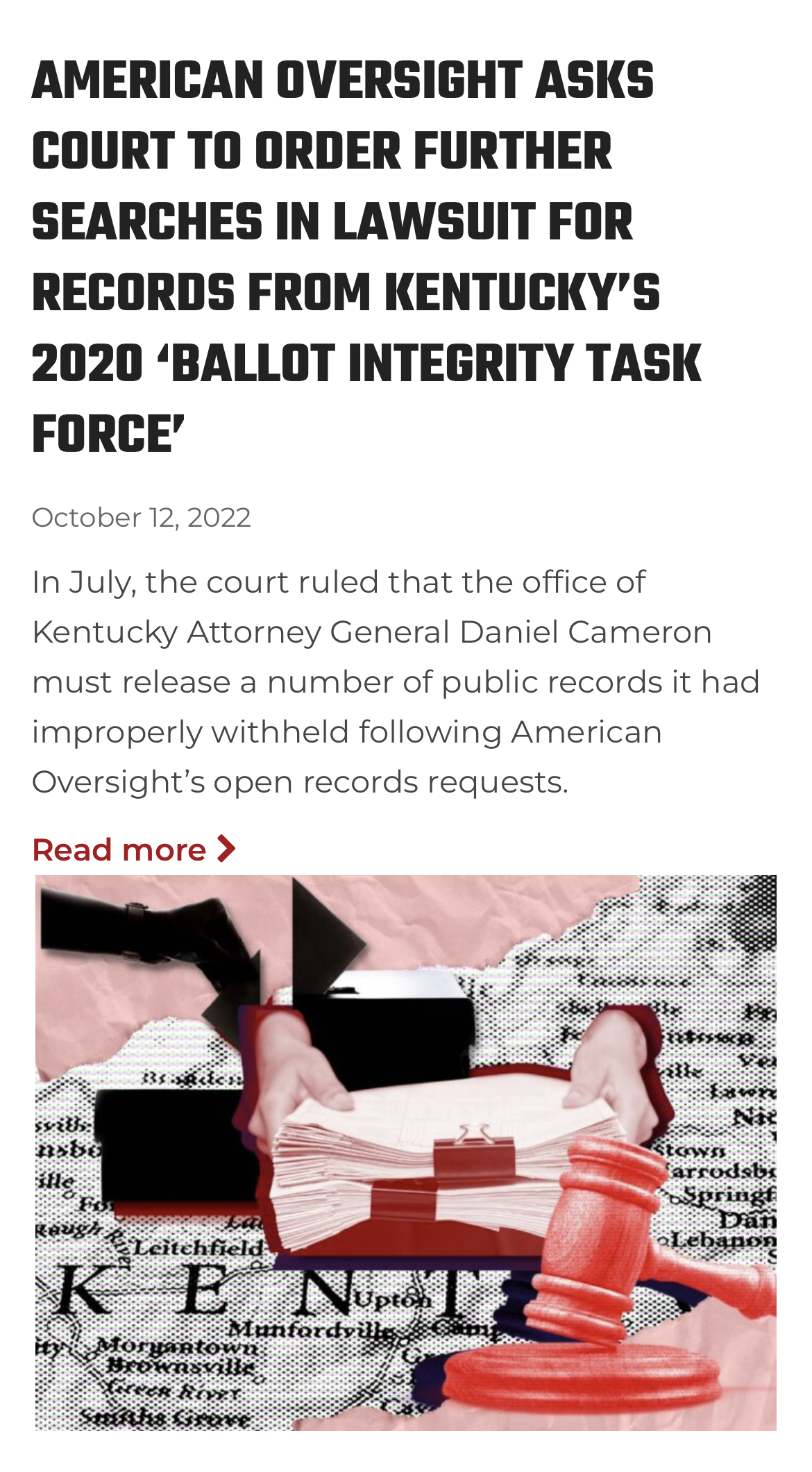
There’s a new development in the open records case now pending in the Franklin Circuit Court involving the Kentucky Attorney General’s denial of access to records of his office.
On October 11, Strobo, Barkley PLLC attorneys Randal Strobo and Julia Taylor — representing American Oversight — filed an Objection to the Office of the Attorney General’s Notice of Compliance with the court’s July 14 order to do, in essence, what the open records law required it to do in the first place: conduct a thorough search for responsive records using methods that were likely to produce the public records sought.
https://www.documentcloud.org/documents/23129251-oct-11-2022-american-o…
In July, the Kentucky Open Government Coalition reported on this major open records victory in the Franklin Circuit Court case pitting American Oversight — “a non-partisan, nonprofit organization that seeks to promote government transparency and accountability” — against the Attorney General.
https://www.documentcloud.org/documents/22087464-20220714-opinion-and-o…
https://kyopengov.org/blog/franklin-circuit-courts-july-14-opinion-majo…
At issue was the Attorney General’s denial of American Oversight’s requests for “emails, agendas, formation-related records, and other documents related to the Absentee Ballot Integrity Task Force which had been announced by the Attorney General and Secretary of State in May 2020.” The Attorney General produced a single record — a meeting agenda — identifying 14 additional responsive records to which it denied American Oversight access.
On appeal, the Attorney General affirmed his office’s denial in an open records decision authored by a non-merit staffer.
https://ag.ky.gov/Resources/orom/2020/20-ORD-147.pdf
The Franklin Circuit Court reversed the Attorney General’s self-serving decision, rejecting his reliance on the “preliminary documents” exceptions and the “law enforcement” exception — codified at KRS 61.878(1)(h) and (i)–(j).
https://apps.legislature.ky.gov/law/statutes/statute.aspx?id=51393
Following inspection of the responsive records withheld, Judge Phillip Shepherd granted American Oversight’s motion for summary judgment. He directed the Attorney General to produce 12 of the 14 previously withheld records, expressing doubt “that the OAG only possessed a handful of records related to such a purportedly expansive Task Force” and questioning the adequacy of the OAG’s search for responsive records.
Shepherd declared that open records requesters “cannot be expected to know all relevant search terms or places where the agency may file such records. To place that burden on the requestor is to invite the agency to hide relevant records that are obscurely labeled or stored in deep recesses of its bureaucratic records system. It is the duty of the agency to conduct and open, thorough, and good faith search of its records in response to an Open Records request.”
See, https://www.courier-journal.com/story/news/education/2017/06/09/univers…
The Court directed the Attorney General’s staff to “perform another, more thorough search beyond [the] application of American Oversight’s suggested search terms” in “all places that might yield responsive results.”
The importance of the holding cannot be overstated.
In July, the Coalition applauded the court’s analysis, commenting:
“At long last, a Kentucky court has established the parameters of an adequate search for public records, placing the burden squarely on the shoulders of the public agency — where it belongs — and lifting it from the shoulders of the open records requester. The latter can no more exhaustively identify all possible search terms that will yield all electronically stored responsive records than s/he can identify the designation on the tab(s) of hard copy file(s) stored in old school filing cabinet(s) that will yield all responsive paper records.
“The requester cannot be ‘expected to request blindly, yet with particularity, documents from a file that he had never seen.’”
https://caselaw.findlaw.com/ky-supreme-court/1387319.html
In its October 11 Objection to Notice of Compliance, American Oversight focuses on the Attorney General’s use of “the fruits of its flawed initial search to form the basis for its second, purportedly more comprehensive search.”
Nothing like, American Oversight declares, the “‘thorough search’ in ‘all places that might yield responsive results.’” Strobo and Taylor pointedly identify specific deficiencies in the Attorney General’s court-ordered supplemental search (that should have been conducted in the first place).
Because the Attorney General’s Notice “does not reflect full compliance” with the July 14 Opinion and Order, Taylor and Strobo ask that the Franklin Circuit Court require the Attorney General to “conduct a thorough and comprehensive search for responsive records and produce all non-exempt documents, including attachments, in usable form” and to “file a supplemental report with the Court describing the efforts to comply.”
Should the Attorney General fail this, American Oversight requests that the Franklin Circuit Court schedule an “evidentiary hearing where appropriate representatives of the OAG can be examined as to the steps taken to identify records responsive to American Oversight’s requests and otherwise comply with the Court’s Order.”
American Oversight’s persistence redounds to the benefit of all Kentuckians who hold dear the public’s right to know.
That, apparently, does *not* include the Kentucky Attorney General and his non-merit staff.


